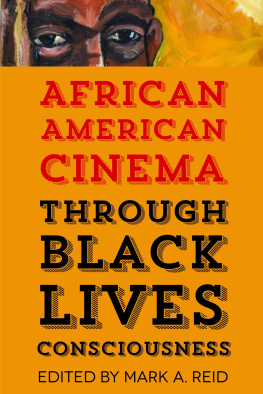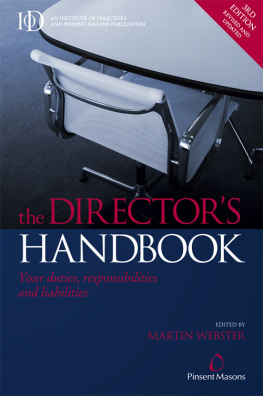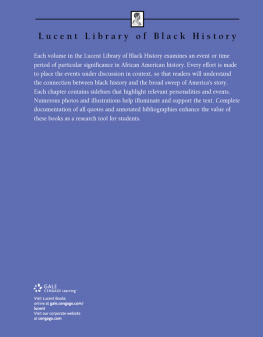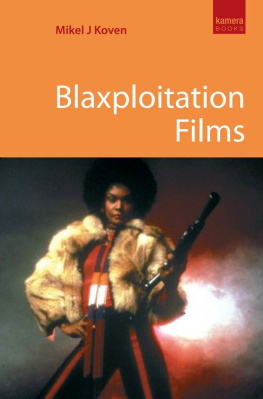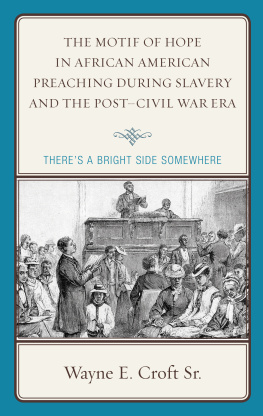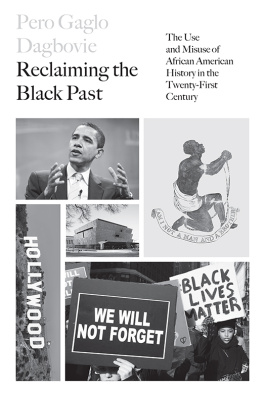Trying to Get Over
AFRICAN AMERICAN DIRECTORS AFTER BLAXPLOITATION, 19771986
Keith Corson

University of Texas Press
Austin
Copyright 2016 by the University of Texas Press
All rights reserved
First edition, 2016
Requests for permission to reproduce material from this work should be sent to:
Permissions
University of Texas Press
P.O. Box 7819
Austin, TX 78713-7819
http://utpress.utexas.edu/index.php/rp-form
LIBRARY OF CONGRESS CATALOGING-IN-PUBLICATION DATA
Corson, Keith, author.
Trying to get over : African American directors after blaxploitation, 19771986 / Keith Corson. First edition.
pages cm
Includes bibliographical references and index.
ISBN 978-1-4773-0907-0 (cloth : alk. paper)
ISBN 978-1-4773-0908-7 (pbk. : alk. paper)
ISBN 978-1-4773-0909-4 (library e-book)
ISBN 978-1-4773-0910-0 (non-library e-book)
1. African Americans in motion pictures. 2. African Americans in the motion picture industry. 3. African American motion picture producers and directors. 4. Motion picturesUnited StatesHistory21st century. 5. Blaxploitation filmsUnited StatesHistory and criticism. I. Title.
PN1995.9.N4C623 2016
791.43'652996073dc23
2015023681
doi:10.7560/309070
In Memory of
MANNING MARABLE
ROBERT SKLAR
JAMAA FANAKA
MARK BEHR
Contents
Acknowledgments
THIS BOOK WOULD NOT HAVE BEEN POSSIBLE WITHOUT the guidance and encouragement of a handful of mentors Ive been lucky enough to have over the years. Ed Guerreros influence was established beforehand from what he put down on the page in Framing Blackness, but getting the chance to work with him one-on-one at New York University was an absolute privilege. I couldnt have asked for a better consigliere, as his support for this project was unwavering, and his humor and zest for life always put everything in the proper perspective. S. Craig Watkins, the Hardest Working Man in Academia, was incredibly gracious with his time and patiently helped me find my way through countless drafts, concepts, and false starts. Melinda Barlow gave me the initial push to start this project and provided me with the confidence to pursue a doctorate. She is the perfect model for matching scholarship with pedagogy and made the University of Colorado at Boulder a transformative experience. Jeff Crouses passion for art and justice made me realize that film studies has the same creative potential as filmmaking itself. The conversations we shared on our Thursday pizza-and-a-foreign-film outings made me a more thoughtful and introspective person.
There has been a spoil of riches in terms of the people Ive had the opportunity to work with over the years. All of them have influenced this project. At NYU, Richard Allen, Manthia Diawara, Dan Streible, Anna McCarthy, Jung Bong Choi, Robert Sklar, and Sheril Antonio all helped shape this book. Paula Massood at Brooklyn College deserves special mention for being so generous with her time and offering invaluable advice. My cohorts in the PhD program at NYU deserve thanks as well, not only for providing feedback on this project but also for serving as a makeshift support group. I owe an enormous debt of gratitude to Nate Brennan, Benjamin Min Han, Michelle Kelley, Benjamin Olin, Intan Paramaditha, and Anastasia Saverino. Robyn Citizen and Noah Tsika also provided insight and encouragement. At the University of Texas, Jennifer Fuller, Thomas Schatz, Joni Jones, and Meta DuEwa Jones helped make Austin a life-changing experience. At the University of Colorado, Ernesto Acevedo-Muoz, Bruce Kawin, Carl Weiman, and James Brody gave me a foundation that I still pull from in and out of the classroom. Thanks also to George Junne at the University of Northern Colorado for making the trek down to Boulder to share his perspective on an early iteration of this project.
Many thanks to all of the people who have given me the opportunity to share my ideas and research in the classroom. To Marshall Boswell, Rebecca Finlayson, Rashna Richards, and everyone in the English Department at Rhodes College, thank you for being so incredibly supportive and welcoming. Thanks to Ellen Daugherty and Remy Miller at Memphis College of Art for giving me the freedom to explore new topics and develop my own approach to teaching film. Thanks to Allison Graham at the University of Memphis as well. Most of all, a thank you is in order to all of the students Ive had the pleasure to teach at Rhodes, MCA, UM, and NYU for allowing me to work through this material and for keeping me honest.
Big thanks are in order to Jim Burr and everyone at the University of Texas Press for making the writing of this book such a great experience. To my peer readers, cloaked in mystery but forceful in your contributions, thank you so much for making this book better and for believing in the project. Katherine Streckfus is an amazing copy editor and deserves special praise. She offered helpful suggestions throughout and worked diligently to make up for my lackluster public school education.
The interviews for this book not only helped to provide crucial information that added depth in context, but also, and more importantly, made this project personal. Thanks to Michael Schultz for setting aside an entire day to talk with me in Santa Monica and for not getting scared off by my obsessive need to unpack every detail of Disorderlies. Thanks to Fred Williamson for taking the time to talk. The Hammer is easily the coolest dude on the planet. Thanks to William Branch, Richard Wesley, Gary Stromberg, and David Dashev for talking to me about their collaborations and providing texture to the book. A deep, heartfelt thank you goes out to Tsia Moses, Carol Moses-Robinson, and Wilma Butler for trusting me to tell part of Gils story. Unquestionably, Gil was a genius, and his spirit lives on through his family. Jamaa Fanaka, my friend for life, was the most invested person in this project. Its my hope that Ive done him justice in the following pages.
Thanks to Ian Strachan and everyone at the College of the Bahamas for organizing the Sidney Poitier International Conference and Film Festival in February 2010. Thanks to Mary Huelsbeck at the Black Film Center and Archive at Indiana University for allowing me access to a number of interviews, clippings, and press kits, not to mention arranging a personal screening of the elusive Passing Through. Thanks to the staff in the rare books and manuscripts division at New York Public Librarys Schomburg Center for Research in Black Culture for all of the help and guidance. An extra-special note of thanks is due to Fred Adams and everyone at HistoryMakers for allowing me to visit their Chicago offices to access oral histories, and later, inviting me to be a test user of their online archive.
NYUs Inter-University Doctoral Consortium afforded me the opportunity to spend a semester at Columbia University working with Manning Marable, who became a great adviser and took an interest in my scholarship. It was a singular pleasure getting to work with Dr. Marable. His fingerprints can be found throughout this book as a key source of inspiration.
My wife, Jamie, obviously, deserves the most thanks of all for being there with me every step of the way and for humoring me during the never-ending game of Six Degrees of Michael Schultz that researching this book inspired. Mom, thanks for raising children who read and for giving me carte blanche to rent whatever I wanted at the video store. Dad, thanks for modeling hard work and for making the movie theater a second home. My sister Brenda, thanks for taking care of me, making me laugh, and for always being the smarter person Im struggling to keep up with. Thanks to all of the Clays, Corsons, Darts, Gaspards, and Von Roenns. Thanks to Sean, Adam, Damian, Nic, Rachael, Dave, Krish, Nicola, Emma, Marc, Mike, Ryan, Lily, Jen, and Christy for being great friends. And finally, to my best friend in the world, Ginger. You were by my side, literally, for the writing of most of this book and taught me more about life than anyone else Ive ever known. The wisdom of a dog is something to behold. You were the wisest of them all.
Next page

